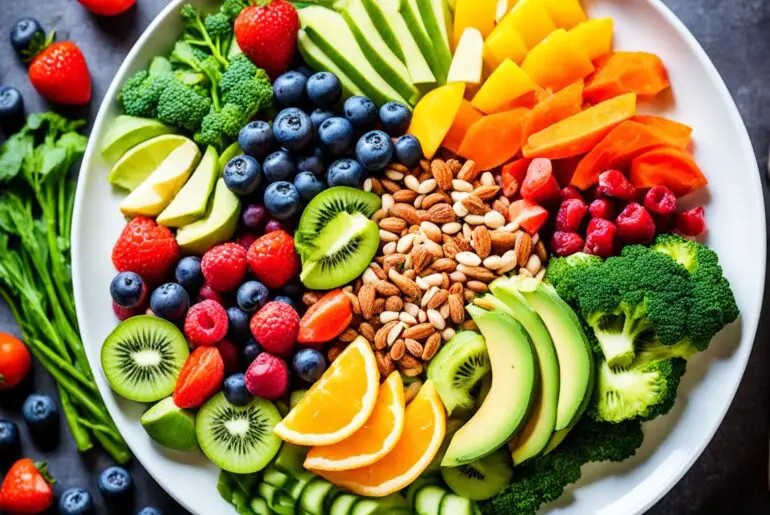Did you know that the HCG diet, a popular weight loss program, is not considered safe or effective by the Food and Drug Administration (FDA)? That’s right, despite its widespread popularity, the HCG diet has not been approved by the FDA and has not been proven to work for its intended purpose.
The HCG diet involves injecting the hormone HCG, which is produced during pregnancy, and severely restricting calorie intake to as low as 500 to 800 calories per day. While proponents of the HCG diet claim rapid weight loss and minimal hunger, there are significant side effects and risks associated with this approach.
Key Takeaways:
- The HCG diet is not approved by the FDA and is considered unsafe and ineffective as a weight loss strategy.
- Side effects of the HCG diet can include fatigue, irritability, depression, fluid buildup, and the risk of blood clots.
- The extreme calorie restriction and limited food choices on the HCG diet can lead to nutrient deficiencies and other long-term health risks.
- There are safer and more effective methods for weight loss, such as evidence-based strategies that focus on healthy lifestyle changes and balanced nutrition.
- It is important to consult with healthcare professionals for personalized guidance based on individual needs and goals when pursuing weight loss.
The Origins of the HCG Diet
The HCG diet traces its origins back to the 1950s when a British physician named Albert Simeons introduced the concept. Simeons claimed that combining the HCG hormone with a very low-calorie diet could result in significant weight loss without muscle loss. However, these claims lack scientific evidence, and the FDA has not approved HCG for weight loss purposes.
The HCG diet involves daily injections of HCG, a hormone produced during pregnancy, along with a calorie restriction of 500 to 800 calories per day. Despite its popularity, the effectiveness and safety of the HCG diet remain highly debated in the medical community.
Potential Benefits of the HCG Diet
Despite the lack of scientific evidence, proponents of the HCG diet claim that it can lead to rapid weight loss. Some testimonials suggest that participants can experience a significant reduction in weight, shedding 20 to 30 pounds in just 40 days, all without feeling hungry or weak.
However, it is important to note that these claims have not been substantiated by research.
When examining the potential benefits of the HCG diet, it is crucial to consider that any weight loss experienced on this plan is likely attributed to the extreme calorie restriction rather than the HCG hormone itself.
While some individuals may indeed experience noticeable weight loss on the HCG diet, it is essential to approach these claims with caution and consider the potential risks associated with this approach.
Recommended Food List on the HCG Diet
The HCG diet offers a carefully curated selection of approved foods to support weight loss. While the diet eliminates many food groups, it includes a variety of lean proteins, non-starchy vegetables, and limited fruits to provide essential nutrients and promote satiety.
Lean Proteins
Lean proteins are a key component of the HCG diet food list. These options offer high-quality protein with minimal fat content, allowing for efficient weight loss. Approved lean proteins include:
- Lean ground beef
- Pork loin
- Turkey cutlets
- Skinless chicken breast
- Baked white fish
Non-Starchy Vegetables
Non-starchy vegetables are low in calories and carbohydrates, making them an excellent choice for the HCG diet. These vegetables provide essential vitamins, minerals, and fiber while helping to keep you feeling full. Recommended non-starchy vegetables include:
- Cauliflower
- Spinach
- Mushrooms
- Zucchini
- Cucumber
- Celery
Limited Fruits
While fruits are generally limited on the HCG diet due to their natural sugars, some options can be enjoyed in moderation. These fruits provide a burst of natural sweetness and essential nutrients. Approved fruits on the HCG diet include:
- Watermelon
- Honeydew
- Cantaloupe
- Berries
It’s important to note that while the HCG diet offers a list of approved foods, it eliminates many other food groups, including grains, dairy, and higher carbohydrate fruits and vegetables. This restricted food list can result in nutrient deficiencies if followed for an extended period. It’s advisable to consult with a healthcare professional or a registered dietitian before starting the HCG diet or any other restrictive eating plan to ensure dietary balance and overall well-being.
| Foods | Category |
|---|---|
| Lean ground beef | Proteins |
| Pork loin | Proteins |
| Turkey cutlets | Proteins |
| Skinless chicken breast | Proteins |
| Baked white fish | Proteins |
| Cauliflower | Non-starchy vegetables |
| Spinach | Non-starchy vegetables |
| Mushrooms | Non-starchy vegetables |
| Zucchini | Non-starchy vegetables |
| Cucumber | Non-starchy vegetables |
| Celery | Non-starchy vegetables |
| Watermelon | Limited fruits |
| Honeydew | Limited fruits |
| Cantaloupe | Limited fruits |
| Berries | Limited fruits |
Safety and Side Effects of the HCG Diet

The HCG diet is not considered safe for weight loss according to the Food and Drug Administration (FDA). The extreme calorie restriction and limited food choices on the HCG diet pose significant risks to overall health and well-being. Side effects associated with the HCG diet include headaches, depression, fatigue, and nutrient deficiencies.
The FDA has not approved the HCG diet for weight loss, citing safety concerns. There have also been reports of serious adverse reactions, including blood clots and cardiac issues. It is crucial to prioritize the safety of your body and consult with a healthcare professional before embarking on any weight loss program.
The HCG diet may promise quick results, but it is important to consider the potential risks and side effects associated with this controversial approach. It is recommended to explore safer and more sustainable weight loss methods that focus on balanced nutrition and regular physical activity.
The Controversy Surrounding the HCG Diet
https://www.youtube.com/watch?v=mJzl6NheRYk
The use of HCG for weight loss is highly controversial, sparking a significant debate among medical professionals and the general public. The Food and Drug Administration (FDA) has taken a firm stance on the matter, issuing warnings against the sale of over-the-counter HCG products. These warnings stem from concerns regarding the safety and effectiveness of these products.
The HCG diet is not approved by the FDA and does not meet the criteria for safe and effective weight loss methods,” states Dr. Jane Williams, a renowned endocrinologist.
The controversy surrounding the HCG diet revolves around various factors. Firstly, critics argue that the diet’s reliance on HCG, a hormone produced during pregnancy, is unsupported by rigorous scientific evidence. Research on the subject is limited, and the FDA has not approved HCG for weight loss purposes.
“The lack of scientific evidence and approval from regulatory bodies raises concerns about the safety and efficacy of the HCG diet,” warns Dr. Mark Thompson, a leading nutritionist.
Additionally, the sale of over-the-counter HCG products is considered illegal, further exacerbating the controversy. These unregulated products may contain unknown ingredients and pose potential health risks to users.
The medical community and registered dietitians unanimously agree that the HCG diet should not be recommended due to its risks and lack of scientific evidence. It is crucial for individuals considering weight loss methods to prioritize evidence-based strategies and consult with healthcare professionals for personalized guidance.
The FDA’s Stance
The FDA has issued warnings against the HCG diet and the sale of over-the-counter HCG products due to safety concerns. The agency emphasizes the potential risks associated with the extreme calorie restriction and the use of unregulated HCG products.
The Medical Community’s Perspective
Leading medical professionals and registered dietitians strongly discourage the use of the HCG diet. They argue that the risks and lack of scientific evidence outweigh any potential benefits claimed by proponents of the diet.
In summary, the controversy surrounding the HCG diet stems from the absence of substantial scientific evidence, FDA warnings against over-the-counter HCG products, and the unanimous agreement among medical experts that the diet poses risks to individuals’ health and well-being. It is crucial for individuals to prioritize safer and evidence-based weight loss methods that focus on long-term sustainability and optimal health.
The Long-Term Effects of the HCG Diet

The long-term effects of the HCG diet remain uncertain due to limited research on its safety and efficacy. However, it is important to consider the potential health risks associated with this diet plan. The extreme calorie restriction and potential nutrient deficiencies involved in the HCG diet can lead to adverse long-term consequences.
Research suggests that sustained low-calorie intake and nutrient deficiencies may increase the risk of developing chronic diseases, including cancer, diabetes, and heart disease. These are serious health conditions that can have a significant impact on one’s overall well-being and quality of life.
To achieve sustainable weight loss and maintain good health, it is recommended to prioritize balanced nutrition and regular exercise over the HCG diet. Adopting a long-term approach that focuses on healthy lifestyle changes can lead to lasting results and improved overall health.
Consulting with healthcare professionals, such as registered dietitians and healthcare providers, can provide personalized guidance tailored to individual needs and goals. They can help design a weight loss plan that is evidence-based and supports long-term success.
The Importance of Balanced Nutrition and Regular Exercise
Adopting a balanced nutrition approach involves consuming a variety of nutrient-dense foods that provide essential vitamins, minerals, and antioxidants. This ensures that the body gets the necessary nutrients to function optimally and maintain overall health. Regular exercise, on the other hand, helps to improve cardiovascular health, build muscle mass, and boost metabolism.
Combining these two elements, balanced nutrition and regular exercise, promotes sustainable weight loss and long-term health benefits. It also reduces the risk of chronic diseases and improves overall well-being. Remember, successful weight loss is not just about shedding pounds but also about maintaining a healthy lifestyle for the long haul.
In conclusion, while the HCG diet may offer rapid weight loss in the short term, it is essential to consider the potential long-term health risks and lack of scientific evidence supporting its efficacy. Embracing evidence-based weight loss strategies that focus on balanced nutrition, regular exercise, and personalized guidance from healthcare professionals is the key to achieving sustainable weight loss and maintaining good health in the long run.
Alternatives to the HCG Diet
If weight loss is your goal, there are safer and more effective methods than the HCG diet. It is recommended to consult with a healthcare provider or a registered dietitian to develop a plan that focuses on healthy lifestyle changes, including a balanced diet and regular physical activity. Safer weight loss methods prioritize gradual, long-term changes rather than extreme calorie restriction or fad diets like the HCG diet.
Instead of relying on the HCG diet, consider incorporating the following healthy lifestyle changes to achieve sustainable weight loss:
- Focus on Balanced Nutrition: Opt for a balanced diet that includes a variety of nutrient-dense foods, such as fruits, vegetables, lean proteins, whole grains, and healthy fats. This ensures you get the essential nutrients your body needs for optimal health.
- Portion Control: Practice portion control by being mindful of your serving sizes. Use smaller plates and bowls, measure your food, and avoid eating directly from the package. This helps prevent overeating and promotes weight management.
- Regular Physical Activity: Incorporate regular exercise into your routine. Aim for at least 150 minutes of moderate-intensity aerobic activity or 75 minutes of vigorous-intensity aerobic activity each week, along with strength training exercises to build muscle and boost metabolism.
- Manage Stress: Find healthy ways to manage stress, such as practicing relaxation techniques, engaging in hobbies, or seeking support from friends and family. Chronic stress can contribute to weight gain, so it’s important to prioritize mental well-being.
- Get Adequate Sleep: Aim for 7-9 hours of quality sleep each night. Sleep deprivation can disrupt hormones that regulate hunger and fullness, leading to increased appetite and a higher risk of weight gain.
By embracing these healthy lifestyle changes, you can achieve sustainable weight loss while promoting overall well-being. Remember, consulting with healthcare professionals can provide personalized guidance tailored to your individual needs and goals.
The Importance of Evidence-Based Weight Loss Strategies
Making informed decisions about weight loss strategies is crucial for long-term success and overall health. It is essential to rely on evidence-based weight loss methods that are backed by scientific research. These strategies focus on sustainable lifestyle changes, ensuring that individuals achieve their weight loss goals while maintaining their overall well-being.
Nutrition:
A key aspect of evidence-based weight loss is incorporating a variety of nutrient-dense foods into one’s diet. This includes consuming a balance of macronutrients such as carbohydrates, proteins, and fats, along with an adequate intake of vitamins, minerals, and antioxidants. Prioritizing whole, unprocessed foods and avoiding processed and sugary snacks can promote weight loss and improve overall health.
Portion Control:
Practicing portion control is another important component of evidence-based weight loss. Learning to recognize appropriate portion sizes and understanding hunger and satiety cues can help individuals regulate their calorie intake and achieve a healthy energy balance. A useful approach is to fill one’s plate with colorful vegetables, lean proteins, and whole grains, while being mindful of portion sizes for higher-calorie foods.
Physical Activity:
Engaging in regular physical activity is a crucial aspect of evidence-based weight loss. Exercise not only helps burn calories but also improves cardiovascular health, builds muscle, and boosts metabolism. Combining cardiovascular exercises, such as brisk walking or cycling, with strength training can help individuals achieve their weight loss goals and maintain a healthy body composition.
Stress Management:
Managing stress is an often overlooked but vital part of effective weight loss. Stress can lead to emotional eating and disrupt sleep patterns, both of which can hinder weight loss progress. Incorporating stress management techniques such as mindfulness, meditation, yoga, or engaging in hobbies can help individuals better cope with stress and maintain a positive mindset throughout their weight loss journey.
Sleep:
Adequate sleep plays a significant role in weight management. Poor sleep has been linked to increased appetite, cravings for unhealthy foods, and decreased motivation for physical activity. Getting enough quality sleep each night can support healthy weight loss by regulating hunger hormones, improving metabolism, and providing the energy needed for physical activities.
It is important to consult with healthcare professionals, such as registered dietitians and medical practitioners, who can provide personalized guidance based on individual needs and goals. They can help individuals navigate the vast amount of information available and develop a comprehensive and customized evidence-based weight loss plan.
By adopting evidence-based weight loss strategies, individuals can achieve their weight loss goals in a safe and sustainable manner. These approaches prioritize overall health, addressing not only weight loss but also long-term well-being. Embracing a balanced lifestyle that combines healthy eating habits, regular physical activity, stress management, and adequate sleep can lead to lasting weight loss success.
Conclusion
After examining the side effects and health risks associated with the HCG diet plan, it becomes evident that this approach to weight loss is not only ineffective but also potentially dangerous. The severe calorie restriction and lack of scientific evidence make it an unsafe method with numerous potential health consequences. From nutrient deficiencies and blood clots to cardiac issues, the risks outweigh any potential benefits.
Instead, it is recommended to prioritize evidence-based weight loss strategies that focus on sustainable lifestyle changes. These methods, backed by scientific research, promote overall health and long-term weight management. Incorporating a variety of nutrient-dense foods, practicing portion control, engaging in regular physical activity, managing stress, and getting adequate sleep are all important components of such an approach.
When pursuing weight loss goals, it is crucial to consult with healthcare professionals who can provide personalized guidance based on individual needs and goals. They can help develop a comprehensive plan that aligns with evidence-based strategies and ensures a safe and effective weight loss journey.
FAQ
What are the side effects of the HCG diet plan?
The side effects of the HCG diet plan can include fatigue, irritability, depression, fluid buildup, and the risk of blood clots.
Who originally proposed the HCG diet?
The HCG diet was originally proposed by a British physician named Albert Simeons in the 1950s.
What are the potential benefits of the HCG diet?
The potential benefits of the HCG diet claimed by proponents include rapid weight loss without feeling hungry or weak. However, these claims are not supported by scientific evidence.
What foods are allowed on the HCG diet?
Lean proteins such as lean ground beef, pork loin, turkey cutlets, skinless chicken breast, and baked white fish are allowed on the HCG diet. Non-starchy vegetables and limited fruits are also permitted.
What are the safety concerns and side effects of the HCG diet?
Safety concerns and side effects of the HCG diet include headaches, depression, fatigue, nutrient deficiencies, and reported cases of blood clots and cardiac issues.
Why is there controversy surrounding the HCG diet?
The HCG diet is controversial because it has not been approved by the FDA for weight loss, has safety concerns, lacks scientific evidence, and has been associated with illegal over-the-counter products.
What are the long-term effects of the HCG diet?
The long-term effects of the HCG diet are unknown, but the extreme calorie restriction and potential nutrient deficiencies can pose long-term health risks and increase the risk of developing chronic diseases.
What are the alternatives to the HCG diet?
Safer alternatives to the HCG diet include focusing on healthy lifestyle changes such as balanced nutrition, regular physical activity, managing stress, and getting adequate sleep.
Why is evidence-based weight loss important?
Evidence-based weight loss strategies are backed by scientific research and focus on sustainable lifestyle changes, making them safer and more effective than fad diets like the HCG diet.
What are the key points about the side effects of the HCG diet plan?
The HCG diet plan can have severe side effects such as gallstone formation, irregular heartbeat, nutrient deficiencies, electrolyte imbalances, fatigue, irritability, depression, fluid buildup, and the risk of blood clots.




